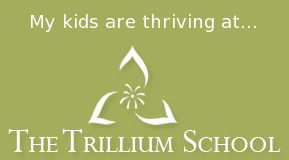Self-efficacy
Nina JeckerByrne recently commented on another website about her experience with sending her children to a Sudbury school (in New York). With her permission, I’ve decided to quote her comment in its entirety (emphasis added):
As a culture we have a death-grip on our belief that kids must be taught x, y, and z or we’re all doomed. Those industrialists did a good job of selling their agenda to the masses! I am sure more and more people will decide to give up on compulsory education, and Sudbury and unschooling will eventually meet with less objection, we just have to be patient and let the outcomes speak for themselves. My oldest is 16, has been at the Hudson Valley Sudbury School for 7 years, and was unschooled previously. He’s never had to study or take tests. He decided he wanted to be a lifeguard for summer employment, took the course and passed all the tests easily! He did it all without reminders or help. He just recently got a 100 on his driver’s permit test after studying on his own for that. No one has ever “taught” him how to read or do arithmetic or how to study for a test, and he is competent in all those things, and is a whiz on computers – especially with Photoshop. All this without formal instruction – entirely by his own motivation and effort. He has demonstrated that he can learn whatever he wants to learn, whether it is on his own or by seeking assistance. We have been underestimating our children in this society for so long that we no longer trust in what is, in fact, natural – kids naturally want to learn and to challenge themselves, unless it has been trained out of them.
What could be more valuable than being able to learn whatever you need to learn whenever you need to learn it? That’s a skill worth taking into adulthood and doesn’t correspond to any particular subject that can be taught. If kids can develop their innate ability to learn and carry it into whatever area interests them, they’ll develop self-efficacy. In other words, they’ll have the general knowledge about themselves that “I can do it”, or “I can figure out what help I need to get it done”. How can you teach that? It has to be learned by experience.
Nina’s story is so typical of kids that are allowed to go all the way through a Sudbury school experience. The school that started it all, Sudbury Valley School, has published extensive information about their alumni. Two books in particular are worth reading if you’re at all concerned about what becomes of students who spend their childhood at a Sudbury school. See the “What becomes of students” page on the SVS website if you’re interested in reading these. One is called The Pursuit of Happiness: The Lives of Sudbury Valley Alumni (2005), and the other is Legacy of Trust: Life After the Sudbury Valley School Experience (1992). If you like quantitative data, you’ll like Pursuit of Happiness, but if you’d rather hear more from the alumni themselves (in the form of essays), read Legacy of Trust, even though it’s a bit older.
It looks like you're new here. You may want to sign up for email alerts or subscribe to the "Lenz on Learning" RSS feed. Thanks for reading.


Nice. Soon it will be my turn to ask you – I hope to start on blog on our Sudbury school site soon – http://www.hudsonvalleyschool.org
Great, Nina, let me know when I can subscribe!